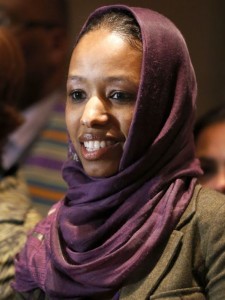There have been a couple of interesting cases recently in the US concerning freedom of expression on the part of university professors. This week Melissa Click, an assistant professor of communication at the University of Missouri at Columbia, has been in the news (article in the Atlantic) due to an incident that occurred in November, when she threatened to bring “muscle” to help her stop a student journalist filming a campus protest and may also have tried to grab the camera herself. She and students involved in the protest had set up what they considered a “safe zone” on the campus quad, where they were protesting police violence. Now a deal has been cut that will allow Click to perform community service rather than face a misdemeanor assault charge. Click is up for tenure this year, but in the meantime she has been suspended from the university.
In December, a professor of political science from a private Christian College near Chicago donned a hijab as a symbol of solidarity with Muslims. The professor, Larycia Hawkins, was placed on leave December 15, and now Wheaton College has initiated the process of firing her. The College states that the cause is not her wearing a hijab, but because of a Facebook post in which she stated , “I stand in religious solidarity with Muslims because they, like me, a Christian, are people of the book. And as Pope Francis stated last week, we worship the same God.” The evangelical Christian beliefs of the College, in contrast to those of the Catholic Church, do not support this view, given the fact that Islam sees Jesus as a prophet, not as divine. Whether that is in fact the reason for the College to fire her is unknown. In an interview on NPR, Hawkins sees her case as going beyond religious views: “It’s a bigger academic freedom question than Wheaton College alone. It’s actually not even just a religious institutional question…I’m not the ‘hijab professor’; I’m the professor that’s trying to teach my students to move beyond theoretical solidarity, sitting on our laurels in the classroom, towards embodied politics, embodied solidarity.”
